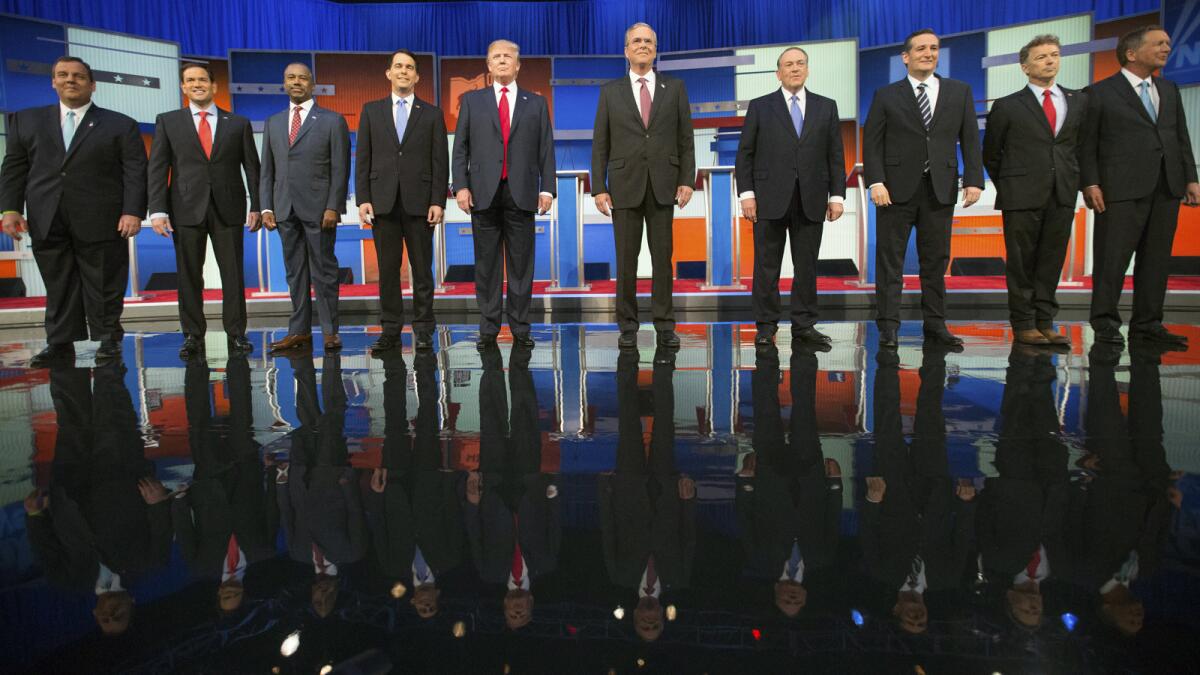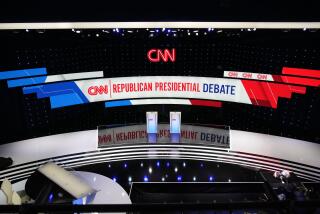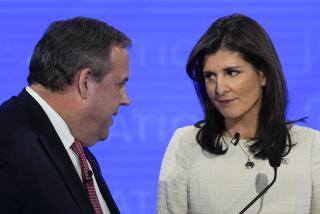Republican presidential debate: 17 compete for attention, with Trump at the center

Republican presidential candidates take the stage in Cleveland before the prime-time debate: from left, Chris Christie, Marco Rubio, Ben Carson, Scott Walker, Donald Trump, Jeb Bush, Mike Huckabee, Ted Cruz, Rand Paul and John Kasich.
The leading Republican presidential candidates used their first face-to-face encounter to accuse celebrity candidate Donald Trump — and one another — of diverging from conservative principles as they tried to reverse the surprising dominance of the billionaire and gain a foothold in the crowded race.
Trump made news Thursday before even uttering a single word. When a moderator asked candidates whether they would pledge to support whoever ultimately won the party’s nomination for president, as well as rule out an independent bid, Trump raised his hand to indicate he wouldn’t.
“I want to win as the Republican. I want to run as the Republican nominee,” he said. But when pressed, he repeated, “I will not make the pledge at this time.”
Sen. Rand Paul of Kentucky, who had promised to mix it up at the debate, was quick to attack Trump, saying he was “already hedging his bets because he’s used to buying politicians.”
Trump’s surprise ascent has complicated an already unruly Republican field, and debate officials separated the 17 candidates into two tiers to provide some order to the lineup at Quicken Loans Arena, home of the NBA’s Cleveland Cavaliers.
TRAIL GUIDE: All the latest news on the 2016 presidential campaign >>
The top 10 candidates, ranked based on national polls, took the prime-time stage — with Trump at the center — before a crowd of 5,000. Seven others tangled earlier on the same stage for what some called a “happy hour” forum.
For most Americans who have not immersed themselves in the machinations of an election still more than 15 months away, it was the best look yet at the Republicans hoping to prevent a third consecutive Democratic presidential term.
Mostly the contenders shared common promises to unravel many of President Obama’s signature accomplishments and push the country rightward. They vowed to stop the nuclear agreement with Iran, reverse Obama’s immigration actions and be tougher on terrorism.
Former Florida Gov. Jeb Bush, who had been seen as the party’s most likely nominee earlier in the campaign, sought to regain his footing after comments on immigration, women’s health and the Iraq war made him a target for both the left and right.
“I governed as a conservative, and I govern effectively,” he said. “We left the state better off because I applied conservative principles in a purple state the right way, and people rose up.”
He also carefully broached the questions of Trump’s ascent.
“Mr. Trump’s language is divisive,” Bush said. “We’re going to win when we unite people with a hopeful, optimistic message.”
Trump, though, made no apologies and doubled-down with an attitude that has become increasingly familiar. “We don’t have time for tone. We have to go out and get the job done,” Trump said.
With such a crowded field, the candidates tried to make the most of their few minutes in the spotlight, skipping over Trump, as Sen. Marco Rubio of Florida and Wisconsin Gov. Scott Walker did, to focus on their own messages.
“If this election is a resume competition, then Hillary Clinton’s going to be the next president because she’s been in office and in government longer than anybody else running here tonight,” Rubio said. “This election better be about the future, not the past. It better be about the issues our nation and the world is facing today, not simply the issues we once faced.”
Ohio Gov. John Kasich, who barely qualified for the main debate as the candidate in 10th place in national polling, said Trump had hit a nerve among Americans, and those “who want to just tune him out, they’re making a mistake.”
“Now, he’s got his solutions. Some of us have other solutions,” he said, before discussing his record as a governor and congressman.
Because Republican primary voters tend to be older and more conservative, the candidates did not shy from polarizing stances, particularly on social issues, pledging to defund Planned Parenthood and not give the Supreme Court the last word on gay marriage.
“A bottle of Wite-Out,” is what former Texas Gov. Rick Perry, on the second-tier stage, promised to bring to his White House, to undo many of Obama’s actions.
“I’m tired of the hyphenated Americans,” said Louisiana Gov. Bobby Jindal. “Immigration without assimilation is an invasion.”
The only woman on either stage, Carly Fiorina, the former Hewlett-Packard chief executive who lost the 2010 race for the U.S. Senate in California and appeared in the preliminary debate, outshined her rivals with crisp attacks on Bush and Democrat Hillary Rodham Clinton.
“We need a nominee who is going to throw every punch, not pull punches, and someone who cannot stumble before he even gets into the ring,” said Fiorina, a copy of whose remarks were found earlier in the day in a hotel printer.
Trump had tamped down expectations before his debut, saying he did not have as much experience debating as others. But his overbearing presence dominated the night.
“He’s tapped into an anger that people feel. They’re sick of politics as usual,” Fiorina said. “Since he has changed his mind on amnesty, on healthcare and on abortion, I would just ask, what are the principles by which he will govern?”
In the prime-time debate, Trump sparred with moderator Megyn Kelly of Fox News Channel, who asked him whether his past comments calling women “fat pigs, dogs, slobs and disgusting animals” made him unelectable, particularly if he was pitted in the general election against Clinton.
“I frankly don’t have time for total political correctness,” he said. “It’s fun, it’s kidding, we have a good time…. If you don’t like it, I’m sorry.”
Paul and New Jersey Gov. Chris Christie engaged in perhaps the night’s most bitter exchange, on whether Americans’ civil liberties were violated by government surveillance programs, as the Kentucky senator believes.
When Paul said he wanted to collect records from terrorists, not innocent Americans, Christie called it a “ridiculous answer” and accused him of “just blowing hot air” on the issue for political convenience.
The back-to-back events are a product of the Republican National Committee’s efforts to regain some measure of control over the debate process after 2012, when many in the party thought the endless string of televised events ultimately worked against it and the eventual nominee, Mitt Romney.
As the GOP candidates traded barbs, Clinton was in California, where she participated in a Los Angeles roundtable discussion on healthcare and in fundraisers in L.A. and San Francisco. Democrats announced their first debate would be held Oct. 13.
Thursday’s debate was among a dozen in the run-up to next year’s primary elections, and Steve Duprey, chairman of the Republican Party’s debate committee, expects the complications will eventually smooth out.
“I wouldn’t be a bit surprised by the next debate if some of the folks who aren’t in the main debate now are, and vice versa,” he said. “I think it’s going to evolve.”
Mascaro and Memoli reported from Washington and Mehta from Cleveland. Times staff writers Kurtis Lee in Los Angeles and Evan Halper, Christi Parsons and Kathleen Hennessey in Washington contributed to this report.
MORE ON CAMPAIGN 2016:
Will the GOP’s next debate include a noogie for Donald Trump?
Bernie Sanders is drawing big crowds -- but how long will they stick around?
Who’s running for president in 2016?
More to Read
Get the L.A. Times Politics newsletter
Deeply reported insights into legislation, politics and policy from Sacramento, Washington and beyond. In your inbox three times per week.
You may occasionally receive promotional content from the Los Angeles Times.









